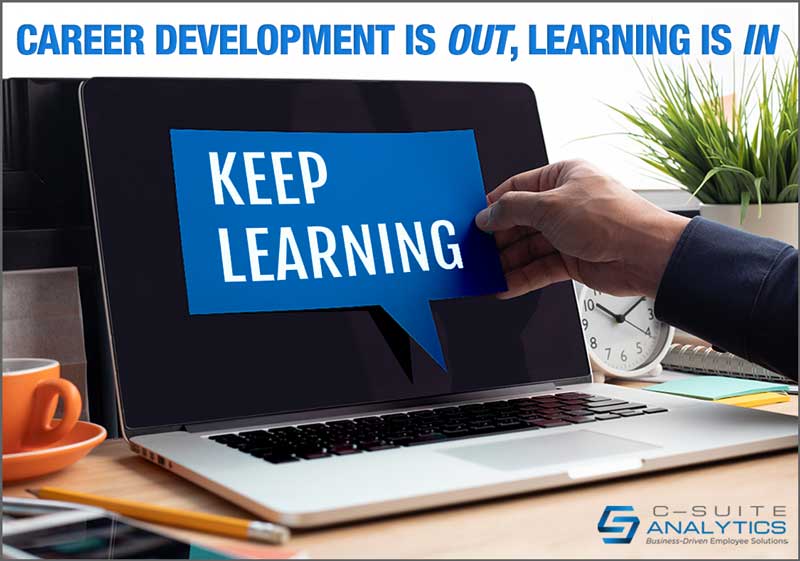AI, deportations, tariffs, and birthrate declines are reshaping America's workforce—blue- and white-collar alike. From baby boomer exits to AI disruptions, breaking down the workforce challenges no leader can afford to ignore.
For Employee Retention Career Development is Out, Learning is In

Is Answer to Stay Interview Question 2 Better Than a Career Development Plan?
How can career development be bad for cutting turnover? Read on here for what might be a controversial opinion.
When our client leaders conduct Stay Interviews one-on-one with their teams, they’ve been trained to ask just five questions. When limiting all of the imaginable questions to just five, those questions had better be the very best ones. Let me then introduce you to question #2 which is What are you learning here?
Q2 bats second in our lineup because helping employees learn is a win-win for all. Employees are stimulated, their curiosities get expanded, their performance is better, and they stay longer with their companies. And all starts with that trust word, that when leaders on all levels indicate a personal interest in helping their employees learn and then enable them to do so, those employees then trust their leaders more.
In my book HR’s Greatest Challenge, I presented 25 studies that confirmed the #1 reason employees stay or leave…or for that matter engage or disengage…is how much they trust their boss. This does not mean that every time an employee quits it’s because she doesn’t trust her boss…but it does mean that your supervisors are your very best resource, your best tool, your best solution, for solving employee turnover and disengagement.
Is Career Development Planning the Same as Learning Plans?
But let’s compare two terms that sound the same but are very different which are career development and learning. About a decade ago several studies indicated the best way to engage and retain employees was to develop a career plan for each of them. So terms like career ladders were born, consultants taught managers how to do career coaching, and tuition reimbursement was coupled with internal training courses so employees could follow predetermined pathways for higher-lever jobs. And to this day we talk with HR executives who report their managers must schedule career meetings with their employees once or twice a year. Doing so makes career development compulsory.
Let’s step back and give career development a hard look regarding some of its bedrock assumptions:
- That every employee wants a career vs a job, meaning they want various jobs beyond their current job with their current company.
Our team works daily with healthcare, manufacturing, call centers and other industries, and in each industry there seem to be few people to want to advance to a supervisor role. Few nurses want to become nurse managers and even fewer manufacturing workers yearn to become bosses. They would accept more money but not necessarily in exchange for managing people.
- That every employee is qualified to earn a career with their current company.
Maybe my loudest objection to “career development” is it builds the expectation that every employee will have a career with your company…that there are promotions, additional roles with higher pay in every employee’s sights. It’s easy to embed that expectation by commanding supervisors to hold career discussions when most employees probably won’t advance very much.
- And that every leader can develop an effective career plan with each of their employees.
It’s tempting here to say that if career development has been the ten-year rage, then how is it that engagement has been flat during that period and turnover has never been higher?
Note that employees not wanting a career is not necessarily a bad thing. During Stay Interview training we ask, “How many of you have employees on your team who are very engaged and great performers but have no interest in getting promoted?” More than half of the leaders say they do. Which trumpets why Stay Interviews are so impactful because they drive those leaders to learn what is important to each employee with no assumptions going in. Careers and promotions matter to some but by far not for all.
Learning Plans Key to Employee Retention
Let me suggest a more practical and more effective approach which is that each leader helps each employee learn new things if the employee wants to learn them. Learning is alive, it’s current, it’s fresh and stimulates the mind to want to learn more. And leaders including first-line supervisors can learn how to help their employees learn.
What do our client supervisors hear when they ask Q2, what are you learning here? A wide range of employee responses. Some say I want to learn something specific, others say I’m bored so help me learn something, and a third group says I just want to do my job and go home. The easy part for supervisors to manage Q2 is coaching employees to identify what they want to learn. The more interesting part is when we teach those supervisors how to develop a learning plan.
Remember when learning used to equal courses, via either internal ones or tuition reimbursement? Very respected Lominger research has told us that the best way employees learn is via on-the-job experience and the worst way is by taking courses. Assigning employees new job tasks can be tricky though because most of us are working at our max. Our client supervisors learn, though, that helping employees learn is far easier and also more impactful than following a pre-determined, one-size-fits-all career plan. Here are just some of the techniques we teach them:
- Ask employees who want to learn something what specifically they want to learn; offer a few suggestions to stimulate their thinking but if they ultimately can’t tell you a new knowledge or skill they want to learn then they likely won’t invest themselves in learning it.
- Once a new learning area has been identified, assume everyone in your company is a tutor; reach out to employees and managers you know and those you don’t to ask if they will meet with your employee to schedule 1-1 meetings to teach them the designated topic.
- Ask the employee to come back to you with their own learning plan, leveraging the internet, Youtube, Quora, Wikipedia, books available online and otherwise…all to provide new information that aligns with the employee’s interest; stimulate them with a few online ideas first if needed to get them started.
- Consult internal and external classes and conferences if they are a direct fit.
- Then build in a follow-up meeting plan to learn both what you employee has learned and how they might apply their new learnings to their current job or a new one.
Career Development Planning Starts with Learning Planning
Asking employees what they want to learn is a test in itself, to measure if they have ambition, energy, and time to not just develop new skills but develop a career with your company. Those are the employees who have earned a true career development discussion.
Helping employees develop a career plan is hard, and one has to wonder how many managers ever become very good at it. But helping employees learn what they want to learn is not only easier but by being easier it becomes more effective. And leaders who develop this skill then apply it over and over with others because they have built a new coaching skill related to helping their employees learn…and the best motivator of all is achievement.
Stay Interviews are Key for Learning Plans and Employee Retention
Schedule a conversation with me at DFinnegan@C-SuiteAnalytics.com to discuss your employee retention roadblocks and I’ll share ideas for how you can move forward and what is working for other companies to cut turnover by 20% and more, even during The Great Resignation that may benefit you.



